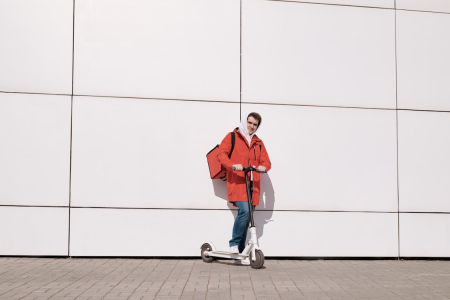Concerned about safety and rising fines? Here’s what the new $2,500 scooter law means for you
By
Maan
- Replies 9
Some South Australians were excited. Others were nervous. But the change is now official—and it could cost you up to $2,500 if you're not careful.
Electric scooters and other personal mobility devices like e-skateboards and e-bikes were officially permitted on many roads and paths across South Australia from Sunday, 13 July.
The legalisation followed months of planning by the state government, which finalised the regulations to allow residents aged 16 and over to operate these devices without a licence or registration—provided they wear a helmet and use flashing lights in low light.
Riders were now able to travel on footpaths, shared paths, bike lanes, and certain roads, but strict conditions applied.
On roads with speed limits up to 60km/h, e-scooter users must ride in the bike lane and not exceed 25km/h.
When riding on footpaths, beaches, or shared pedestrian areas, they must stay under 10km/h.
E-skateboards and similar personal electric devices could only be used on roads with a maximum speed limit of 50km/h, with the same 25km/h cap.
It remained illegal to carry passengers, use mobile phones, or ride under the influence of alcohol or drugs.
Breaching the most serious offences—such as dangerous use or intoxication—could result in fines of up to $2,500.
There were more than 1.3 million registered drivers in South Australia, all of whom would now be required to adjust to the growing presence of these personal mobility devices on the roads.
Public transport remained off-limits, with e-scooters and e-skateboards still banned on Adelaide’s Metro trains, trams, and buses.
South Australian Transport Minister Tom Koutsantonis defended the timing of the rollout, stating: ‘The state government has taken its time because we want to get this right.’
He added: ‘The reason we've taken our time is because this is new technology, and I believe it's going to be embraced. This is a great way of people being able to access carbon-free transport, it's being embraced by young people...it is a cost-effective way of travelling.’
A government review of the new rules was set to take place in July next year.
Elsewhere in Australia, concerns around the safety of these devices had grown after several high-profile incidents.
In Perth, a man died after being struck by two women riding a scooter, prompting the city to ban e-scooter hires.
Queensland also reported multiple deaths involving e-scooters and was expected to implement tighter restrictions.
In New South Wales, parents were caught riding with small children on e-scooters, while others were seen taking them onto highways and tunnels.
Doctors and hospital officials had sounded the alarm over a rise in injuries, pointing to unsafe and illegal use as a growing problem.
If you thought the new rules in South Australia were strict, wait until you see what’s happening elsewhere.
Authorities have already begun cracking down in other states—especially when it comes to unsafe or illegal e-scooter use.
One recent case involved a hefty fine handed down for behaviour that many people see far too often.
Read more: If unsafe e-scooter rides by kids get under your skin, you’ll want to hear about this $1,161 fine

Will this change make your commute greener—or more dangerous?
Electric scooters and other personal mobility devices like e-skateboards and e-bikes were officially permitted on many roads and paths across South Australia from Sunday, 13 July.
The legalisation followed months of planning by the state government, which finalised the regulations to allow residents aged 16 and over to operate these devices without a licence or registration—provided they wear a helmet and use flashing lights in low light.
Riders were now able to travel on footpaths, shared paths, bike lanes, and certain roads, but strict conditions applied.
On roads with speed limits up to 60km/h, e-scooter users must ride in the bike lane and not exceed 25km/h.
When riding on footpaths, beaches, or shared pedestrian areas, they must stay under 10km/h.
E-skateboards and similar personal electric devices could only be used on roads with a maximum speed limit of 50km/h, with the same 25km/h cap.
It remained illegal to carry passengers, use mobile phones, or ride under the influence of alcohol or drugs.
Breaching the most serious offences—such as dangerous use or intoxication—could result in fines of up to $2,500.
There were more than 1.3 million registered drivers in South Australia, all of whom would now be required to adjust to the growing presence of these personal mobility devices on the roads.
Public transport remained off-limits, with e-scooters and e-skateboards still banned on Adelaide’s Metro trains, trams, and buses.
South Australian Transport Minister Tom Koutsantonis defended the timing of the rollout, stating: ‘The state government has taken its time because we want to get this right.’
He added: ‘The reason we've taken our time is because this is new technology, and I believe it's going to be embraced. This is a great way of people being able to access carbon-free transport, it's being embraced by young people...it is a cost-effective way of travelling.’
A government review of the new rules was set to take place in July next year.
Elsewhere in Australia, concerns around the safety of these devices had grown after several high-profile incidents.
In Perth, a man died after being struck by two women riding a scooter, prompting the city to ban e-scooter hires.
Queensland also reported multiple deaths involving e-scooters and was expected to implement tighter restrictions.
In New South Wales, parents were caught riding with small children on e-scooters, while others were seen taking them onto highways and tunnels.
Doctors and hospital officials had sounded the alarm over a rise in injuries, pointing to unsafe and illegal use as a growing problem.
If you thought the new rules in South Australia were strict, wait until you see what’s happening elsewhere.
Authorities have already begun cracking down in other states—especially when it comes to unsafe or illegal e-scooter use.
One recent case involved a hefty fine handed down for behaviour that many people see far too often.
Read more: If unsafe e-scooter rides by kids get under your skin, you’ll want to hear about this $1,161 fine
Key Takeaways
- E-scooters and e-skateboards are now legal in South Australia under strict conditions.
- Riders must be over 16, wear helmets, and follow speed limits based on location.
- Hefty fines of up to $2,500 apply for serious rule breaches, including intoxicated riding.
- Other states have already seen injuries and deaths linked to personal mobility devices.
Will this change make your commute greener—or more dangerous?








